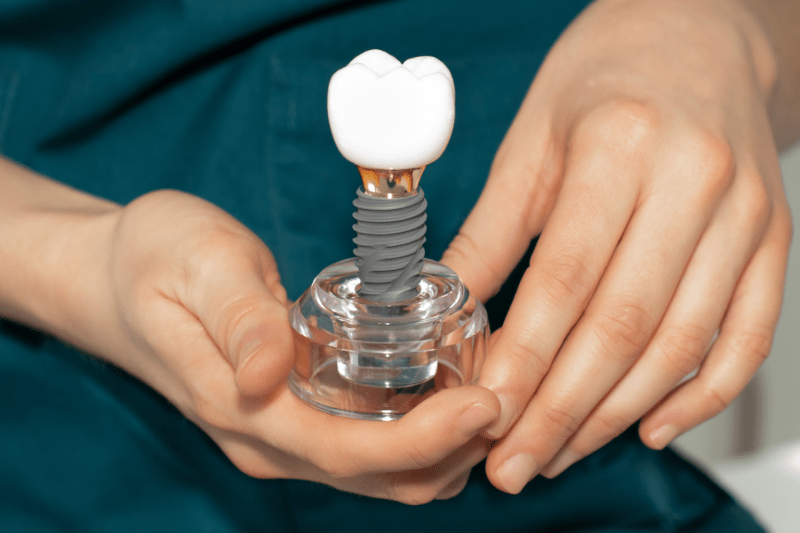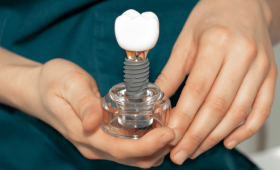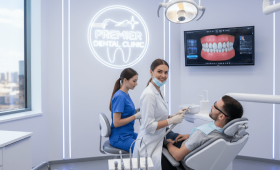What Are the Main Factors Affecting Dental Implant Prices in Northern Ireland?
Dental implant prices in Northern Ireland vary widely depending on several factors. One of the most important factors is the brand of the implant used; internationally recognized premium brands like Nobel Biocare or Straumann are more expensive compared to more affordable local or Asian brands. The complexity of the treatment also plays a big role in the price.
For example, a full-mouth restoration instead of a single implant or the need for additional surgical procedures (sinus lift, bone graft) due to bone deficiency significantly increases the total cost. In addition, the location of the clinic (large cities like Belfast are generally more expensive) and the dentist’s level of expertise and experience are also determining factors in pricing.
What is the Average Cost of a Single Dental Implant in Northern Ireland?
The average cost of a single dental implant in Northern Ireland can range from £2,000 to £4,000, depending on the clinic and the scope of the treatment. This price usually includes the implant itself and the surgical placement procedure.
However, the abutment (connecting piece) and crown (tooth veneer) to be placed on it may not be included in this price, which increases the total cost. Some clinics offer package prices, while others charge for each stage separately. Therefore, it is vital to get a written quote that includes all expenses before starting the treatment.
What Are the Most Popular Cities for Dental Implants in Northern Ireland?
The most preferred city for dental implant treatment in Northern Ireland is undoubtedly the capital, Belfast. Belfast is the most developed city in terms of both population density and healthcare services, and it is home to many specialized dental clinics.
Other important cities include Derry/Londonderry and Lisburn. It is also possible to find quality clinic services in these cities, but prices and dentist options may be more limited compared to Belfast. Patients generally prefer large cities that offer the best opportunities to complete the treatment comfortably and receive a high-quality service.
How Do Dental Implant Prices in Northern Ireland Compare to Other Parts of the UK?
Dental implant prices in Northern Ireland can generally be more affordable compared to major cities in mainland UK (London, Manchester). The high rent and operational costs of an implant clinic in London are directly reflected in the treatment prices. In contrast, the cost of living and business expenses in Northern Ireland are lower, which allows implant prices to remain more competitive. However, prices in Northern Ireland are still significantly higher than in countries prominent in health tourism, such as Turkey.
What Are the Main Advantages of Getting Implant Treatment in Northern Ireland?
One of the most important advantages of getting dental implant treatment in Northern Ireland is that it is subject to the high health standards and strict regulations of the United Kingdom. This ensures that patients can be confident in the quality and hygiene of the treatment. Dentists are licensed by the General Dental Council (GDC) and are required to continuously maintain their professional development. In addition, the lack of a local language and cultural barrier provides ease of communication for English-speaking patients. The fact that post-treatment check-ups can be easily done is another great advantage.
How Do a Dentist’s Experience and Expertise Affect the Price?
A dentist’s experience and expertise are one of the most important factors that directly affect implant costs. A dentist who has received special training in implantology, has many years of experience, and has performed hundreds of successful operations, may charge a higher fee. The quality of service these dentists provide and the low risk of failure can justify this increase in cost. An inexperienced or newly graduated dentist’s prices may be lower, but this can bring higher risks.
What Are the Main Materials Used in Dental Implant Treatment?
The most common material used in dental implant treatment is titanium, a biocompatible metal. Titanium is easily accepted by the human body and permanently integrates with the jawbone. This feature ensures that the implant is long-lasting. Titanium implants have been used safely in dentistry for many years. In addition to titanium, zirconium implants, which offer an appearance closer to the natural tooth color, are also preferred for patients with aesthetic concerns or metal allergies. Zirconium implants are generally more expensive than titanium.
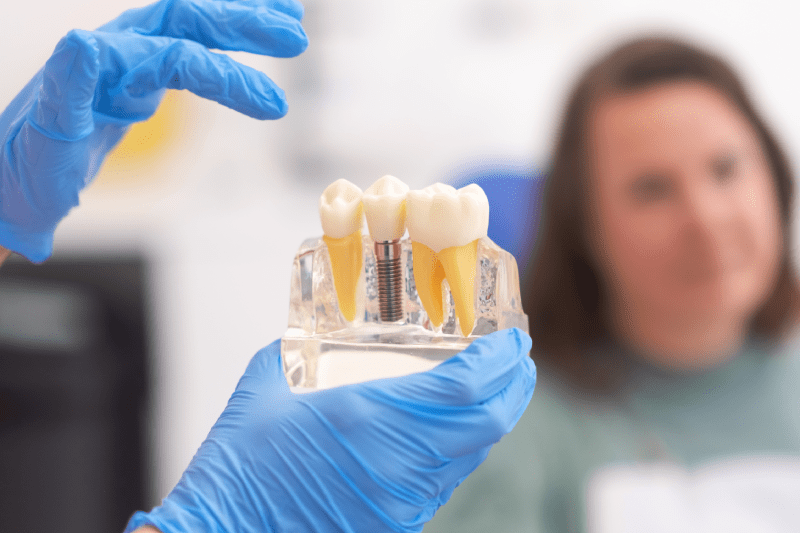
Is Dental Implant Treatment a Painful Procedure?
Dental implant treatment is a painless procedure as it is performed under local anesthesia. The patient does not feel any pain or discomfort during the procedure. A slight pain or swelling may occur for a few days after the procedure, but this can usually be controlled with simple painkillers and passes quickly. Most patients find the implant operation even less painful than a tooth extraction. Your dentist will provide you with all the necessary information to make your post-treatment process comfortable.
How Long Does the Total Duration of Dental Implant Treatment Take?
Dental implant treatment is generally a two-stage process and can take several months in total. In the first stage, the implant is surgically placed in the jawbone, and a healing period of 3 to 6 months is expected for the implant to fuse with the bone. This process may vary depending on the patient’s general health and bone quality. In the second stage, the treatment is completed by placing the abutment and prosthetic crown on the implant. Although this process can be reduced to a single day with some modern techniques, most standard treatments require this duration.
Who Can Get Dental Implant Treatment?
Dental implant treatment can be applied to individuals whose jawbone development is complete (usually over 18 years of age), who are in good general health, and who pay attention to oral hygiene. One of the most important conditions for the success of the implant is to have sufficient bone volume and density. Implant treatment may not be suitable for patients with serious health problems such as uncontrolled diabetes, advanced bone loss, or immune system diseases. The dentist determines the patient’s suitability for the implant with a detailed examination and X-ray.
How Do Additional Procedures Like Bone Grafting or Sinus Lifting Affect the Cost?
Additional procedures such as bone grafting or sinus lifting may become mandatory for patients who do not have sufficient bone volume for implant placement. These additional surgical procedures increase the complexity and duration of the treatment, which significantly increases the total cost. The cost of bone grafting varies depending on the material used (synthetic, animal-derived, or bone taken from the patient’s own body) and the size of the procedure. Such additional procedures must be taken into account when planning the total treatment budget.
What Is the Lifespan of Dental Implants?
Dental implants can be used for a lifetime when applied correctly and with proper oral hygiene. Scientific studies show that the ten-year success rates of dental implants are over 95%. Regular brushing, flossing, and going to the dentist for a check-up every six months are of great importance to extend the life of the implant. Staying away from habits such as smoking and alcohol also helps protect implant health. The choice of a quality implant and an experienced dentist also extends this lifespan.
What Is the Cost of a Full-Mouth Implant Treatment?
Full-mouth implant treatment is usually offered with concepts such as “All-on-4” or “All-on-6”. In these treatments, four or six implants are used to place a fixed prosthesis on the jawbone of a patient who is missing all their teeth. The cost of this treatment in Northern Ireland can range from £15,000 to £30,000, depending on the number of implants, the brand, and the type of prosthesis. This cost may vary depending on the patient’s specific condition and treatment plan and can often include additional expenses (such as a temporary prosthesis).
What Implant Brands Do Dentists in Northern Ireland Typically Use?
Dentists in Northern Ireland generally prefer implant brands that have proven quality and reliability internationally. The most commonly used brands include Straumann, Nobel Biocare, Astra Tech, and Zimmer. These brands have high success rates supported by years of clinical research. Some clinics may also use other brands to offer more affordable treatments. It is important to discuss in detail with your dentist which brand is suitable for you.
What Are the Financing Options for Dental Implant Treatment?
Since dental implant treatment can be quite costly in Northern Ireland, many clinics offer various financing options to patients. In addition to standard payment methods such as credit card and bank transfer, clinics can also often assist patients with installment payment plans or special healthcare loans. These options make the treatment more accessible by reducing the financial burden. It would be useful to learn about your clinic’s policies on this matter in advance.
Does Private Dental Insurance Cover Dental Implants?
Most private dental insurance in Northern Ireland does not cover all or part of the dental implant cost. Insurance companies often view such procedures as aesthetic or keep their coverage limited. However, some support may be provided if the implant is done out of a medical necessity (e.g., tooth loss due to an accident). Therefore, it would be useful to contact your insurance company to learn about the coverage conditions and obtain the necessary documents.
How Are Post-Treatment Emergencies Managed?
For rare emergencies that may occur after dental implant treatment (severe pain, bleeding, or swelling), clinics have emergency services or 24-hour phone lines. Before treatment, it is important to ask your clinic what kind of procedure they follow in case of emergencies and which communication channels you should use. For a serious emergency, you can call 999. In this way, you can get quick support in an unexpected situation.
What Should We Eat and What Should We Pay Attention to After a Dental Implant?
For the first few days after the implant is placed, it is important to avoid very hot, hard, or spicy foods. Your dentist will usually recommend a soft diet. You should brush your teeth regularly and clean the area around the implant using dental floss and an interdental brush. Habits such as smoking and alcohol can negatively affect the healing process. In addition, you should avoid putting pressure on the area where the implant is placed during the healing process.
How Often Do Dental Implants Require Maintenance?
Dental implants, like natural teeth, require regular maintenance. You should brush your teeth at least twice a day and clean the area around the implant using dental floss and an interdental brush. In addition, going to your dentist for a regular check-up at least every six months will ensure that your implant lasts a long time. In these check-ups, the condition of the implant and the surrounding tissues is evaluated, and possible problems can be detected at an early stage.
What Are the Reviews of Patients Who Have Had Implant Treatment in Northern Ireland?
The reviews of patients who have had dental implant treatment in Northern Ireland are generally positive. Patients are satisfied with the professionalism of the dentists, the cleanliness of the clinics, and the use of modern technologies. Especially patients who turn to private clinics due to long waiting times in the national health system (NHS) highlight the quality and speed of the service. However, every patient’s experience is personal and may differ.
What Is the Difference Between a Dental Implant and a Dental Bridge?
A dental implant is an artificial tooth root placed in the jawbone to replace a missing tooth. It provides a natural feel and function because it is integrated into the jawbone and does not harm adjacent teeth. A dental bridge, on the other hand, is a prosthesis placed on the adjacent teeth after they have been reduced to replace a missing tooth. Bridges can damage sound adjacent teeth because they require them to be ground down and cannot prevent bone loss in the jawbone. Implants are a more long-lasting and protective option.
What Is the All-on-4/All-on-6 Concept in Full-Mouth Treatment?
All-on-4 and All-on-6 are fixed prosthesis concepts applied to patients who are missing all of their teeth or whose teeth need to be extracted. In All-on-4, a fixed prosthesis is placed on four implants, while in All-on-6, six implants are used. These concepts aim to provide a full dental restoration with fewer implants and require additional expertise because the implant placement is done at a special angle.
What Is the Role of Health Tourism Agencies in Northern Ireland?
Northern Ireland is not as popular as countries like Turkey or Hungary for health tourism. Therefore, health tourism agencies are not very common in Northern Ireland, and patients usually have to organize all the treatment processes themselves. However, some large clinics may offer support to patients coming from abroad with appointments, accommodation, and transportation.
What Are the Best Seasons for Dental Implant Treatment?
There is no seasonal restriction for dental implant treatment. The treatment can be done safely in any season. However, due to the cold and rainy climate of Northern Ireland, it may be more comfortable for patients who plan to spend time outdoors during the post-treatment healing process to prefer the spring or summer months. This situation is entirely based on personal preference.
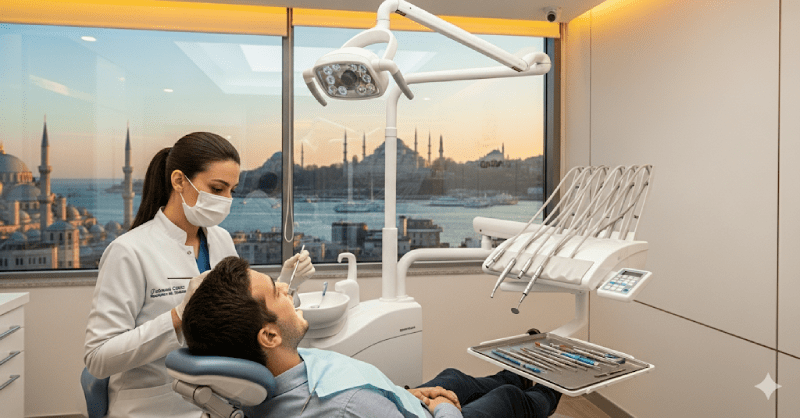
Is a Visa Required to Travel for Treatment in Northern Ireland?
Northern Ireland is part of the United Kingdom. Therefore, citizens of the Republic of Turkey are required to obtain a visa to travel to the United Kingdom. You need to apply for a visa for medical treatment purposes. When applying for a visa, it is important to document the purpose of your trip, your clinic appointments, and your financial resources. It is of great importance to check the current visa and travel conditions before making travel plans.
What Happens If a Dental Implant Fails?
Dental implant failure is a rare condition and usually occurs due to reasons such as the bone not accepting the implant or an infection. If the implant fails, it is removed by the dentist, and a new implant can be placed after the healing process is complete. Reliable clinics offer a warranty or revision treatment for such situations. It is important to learn the conditions of these guarantees in advance.
How Right Is It to Decide Based on Price Alone?
Since dental implant treatment is a serious surgical procedure, it is not right to decide based on price alone. Choosing the clinic that offers the lowest price can bring risks such as low-quality materials, inexperienced dentists, or poor hygiene standards. The most logical approach is to evaluate the price along with the clinic’s reputation, the dentist’s expertise, the implant brand used, and the quality of service provided. Remember, your oral health is the most important investment in the long run.
What Is the Success Rate of Dental Implant Treatment?
The success rate of dental implant treatment is quite high. When experienced dentists and quality implant brands are used, the success rate can exceed 95%. Factors affecting success include the patient’s general health, oral hygiene, smoking and alcohol habits, and the bone density of the area where the implant is placed. Smoking and inadequate oral hygiene can significantly increase the risk of failure.
Is It Safe to Get Dental Implants?
Dental implant treatment is an extremely safe procedure when applied correctly. Implants are made of biocompatible materials that are easily accepted by the body. Working in sterile conditions and with modern equipment is of critical importance to minimize the risk of infection. Following hygiene rules before and after the procedure increases safety and ensures the success of the treatment.
How Can I Reach Specialized Clinics for Dental Implants in Northern Ireland?
You can follow various ways to reach specialized clinics for dental implants in Northern Ireland. First, you can search for licensed dentists on the website of the General Dental Council (GDC) in the United Kingdom. In addition, online patient forums and reviews on clinic websites can help you find the right clinic. Some specialized clinics may focus on implantology, oral surgery, or aesthetic dentistry.
How Far in Advance Should an Appointment Be Made for Treatment?
For dental implant treatment in Northern Ireland, it is usually necessary to make an appointment several weeks or months in advance, especially during busy periods. For patients from abroad, contacting the clinic in advance for an appointment and travel planning ensures a smooth process. In this way, you have enough time for both treatment planning and travel arrangements and can avoid waiting times.
What Are the Pre- and Post-Treatment Care Tips?
Before treatment, it is important to pay maximum attention to your oral hygiene as recommended by your dentist. This reduces the risk of infection. After treatment, you should eat soft foods for the first few days and continue brushing your teeth and using dental floss. Using antibiotics or painkillers prescribed by your dentist regularly will speed up the healing process.
What Technologies Are Used in Dental Implant Treatment?
In modern dental clinics, advanced technologies that make dental implant treatment safer and faster are used. These technologies include digital tomography (CBCT) used for implant planning, surgical guides created with 3D printers, laser technology, and computer-aided design and manufacturing (CAD/CAM) systems. These technologies increase the success rate by making both the diagnosis and the treatment process more precise.
What Are Patient Rights in Northern Ireland?
Patient rights in Northern Ireland are strictly protected by the health care regulations in the United Kingdom. Patients have the right to be fully informed about the treatment process, get a second opinion, and refuse the treatment plan. Before starting the treatment, it is important to sign a contract or agreement stating all the conditions in writing to protect your rights.
How Does the Treatment Plan and Billing Process Work?
Before starting the treatment, a comprehensive treatment plan is created with a detailed consultation with your dentist. This plan clearly states all the procedures to be done, the materials to be used, and the total cost. The billing process usually proceeds in stages; a separate payment plan can be created for each stage, such as implant placement, healing, and prosthesis placement. A reliable clinic presents all costs transparently and informs the patient about additional fees in advance.
